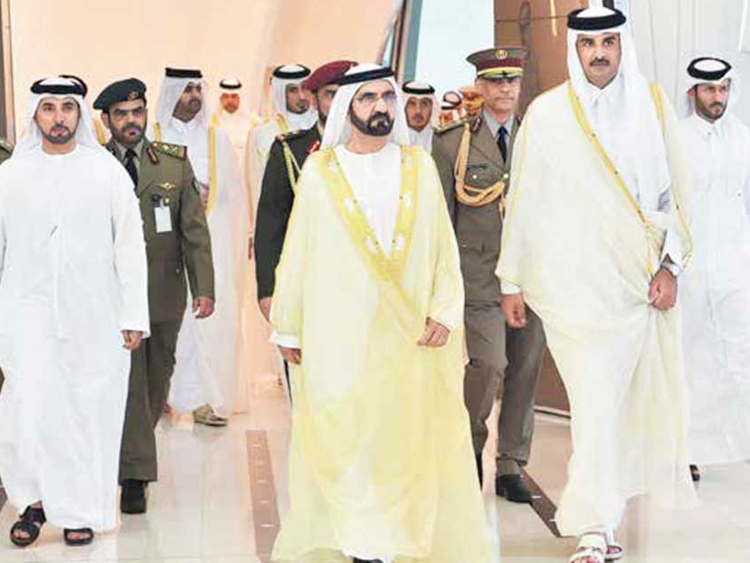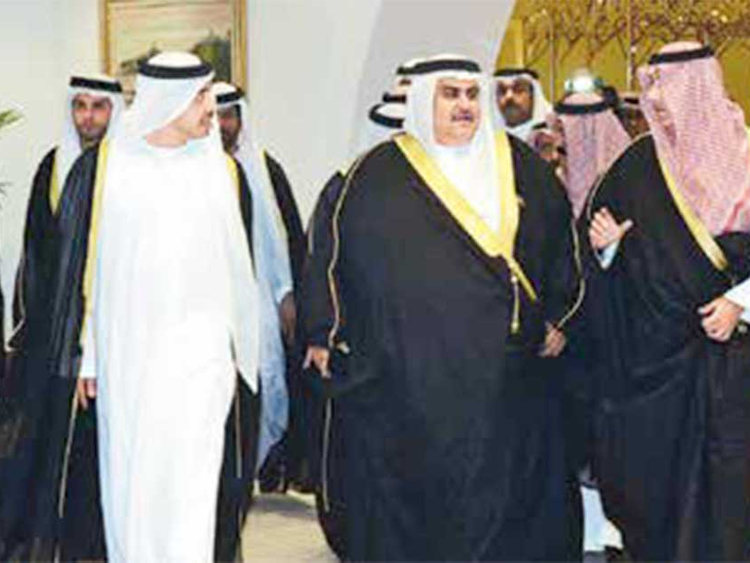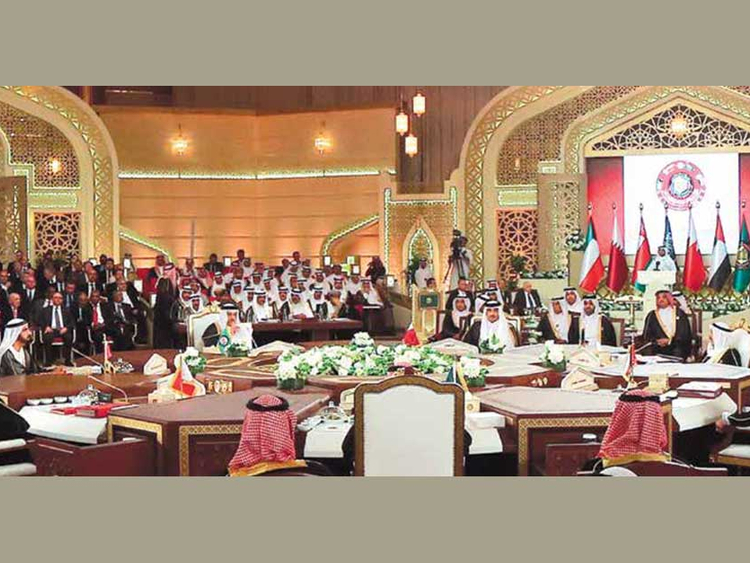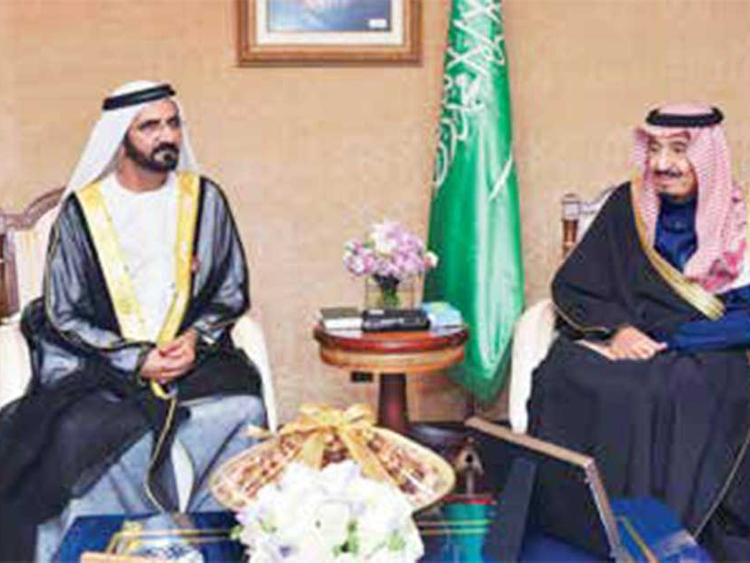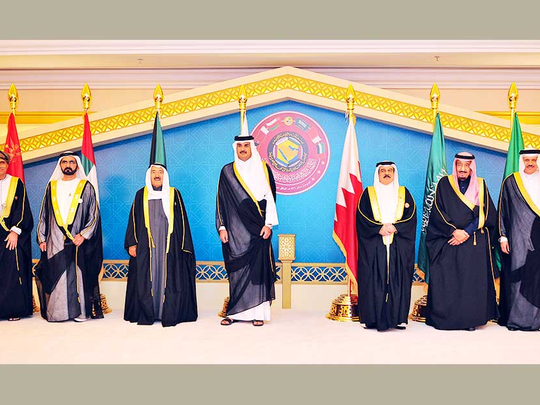
Dubai: The Emir of Qatar, Shaikh Tamim Bin Hamad Al Khalifa called upon the international community to intensify its efforts to confront terrorism and tackle its roots and causes.
Opening the 35th summit of the Gulf Cooperation Council (GCC) in the Qatari capital Doha this evening, host Shaikh Tamim, said that terrorism witnessed throughout the world, and particularly in the Arab region, highlighted the need to address its roots.
Shaikh Tamim whose country is hosting the first GCC summit since he became Emir last year, warned there was a crucial need to pay attention to the fact that violence and oppression bred further violence and oppression. “The phenomenon of terrorism, throughout the world, and in the Arab region in particular, and the grave challenges it poses to the security, stability and development, require us, and the international community in general, to intensify the collective effort and take all necessary measures to confront it, tackle its roots as well as its political, social and economic causes,” Shaikh Tamim said.
“We have to pay attention to a simple equation that violence, persecution, repression and hopelessness lead to violence,” he said.
He stressed that there was also a need to make sure that terrorism does not proliferate and that extremist ideologies do not attract young minds.
“We must exert efforts to spare Arab societies the scourge of extremism and terrorism. Young people who are attracted to it are not born extremists, and terrorism does characterize a particular country or culture. Prevention should be done by addressing the causes of immune deficiency and reducing the likelihood of the spread of infection, before the exacerbation of the disease,” he said.
Shaikh Tamim added that the summit was held against the backdrop of very complicated and delicate international and regional circumstances.
“This puts further responsibilities on the leaders to enhance joint work in line with the aspiration of the people of the GCC,” he said, quoted by Qatar News Agency (QNA).
Shaikh Tamim expressed his hope “that this summit will set the foundation for a new takeoff in Gulf relations through strengthening the spirit of fraternity and solidarity”.
He said that “the uncertainty characterizing the current global and economic context, in addition to the deep-rooted political and economic transformations the world is witnessing call on the GCC members to work towards economic and development integration.”
The Emir highlighted that the initiative by the Custodian of the Two Holy Mosques King Abdullah Bin Abdul Aziz Al Saud calling for a Gulf union would remain a “lofty goal.” However, he added that believing in that goal required gradual steps towards economic integration “as well as social and cultural relations among our peoples that would eventually lead to achieving our common goals and interests.”
The recent experiences “have taught us not to rush to convert disagreement in political viewpoints and assessing a political situation, which may arise even among the leaders, into differences that would affect sectors such as the economy, society, media and others,” he said.
Should the mechanisms and institutions of cooperation and collaboration fail to continue functioning throughout the stages of difference of opinion, the indication would be that “we have not succeeded yet in establishing a strong foundation for this organization.”
“If the fraternal relations of our peoples were not taken for granted during the crises, then the GCC remains an elitist body. There are things that are to be taken for granted and must not be questionable at any time in terms of the relations among the GCC states and peoples,” he said.
“In the face of challenges and risks surrounding us from all sides we must not get caught up in marginal disputes over details. It is high time that the Council defines its role and position on the political map of the region on the basis of the strategic position of its countries as well as their potentials and common interests because the great powers do neither wait, nor they listen to moral appeals. It seems that they only deal in the language of interests, and with the one who proves his strength on the ground in the region,” Shaikh Tamim said, QNA reported.
The leaders of Gulf countries were to hammer out a common strategy to fight the threat from Islamist extremism and plunging oil prices. In his opening remarks, Shaikh Tamim stressed the need for Gulf unity amid the turbulent times in the region but warned that changes would only happen gradually.
His Highness Shaikh Mohammad Bin Rashid Al Maktoum, Vice President and Prime Minister and Ruler of Dubai, led the UAE delegation to the 35th annual Gulf Cooperation Council (GCC) Summit.
Shaikh Tamim also welcomed nuclear negotiations between the West and Iran over its nuclear programme and said that it is a positive step and would help prevent an WMD arms race throughout the region. He condemned the recent Israeli aggression in Occupied Jerusalem and stressed the importance to resolve the Palestinian issue as well as the Syrian issue. Prolonging the conflicts in Palestine and Syria help to breed terrorism, the Emir of Qatar said.
The leaders of GCC members discussed relations with neighbouring Iran, economic integration as well as unrest in Syria, Iraq and Yemen.
The summit, was shortened to just one day, from two previously scheduled, according to organisers who gave no reason for the reduction.
Saudi Arabia, the United Arab Emirates and Bahrain have returned their ambassadors to Qatar after recalling them in March in protest at Doha’s perceived interference in their internal affairs with its support for the Muslim Brotherhood.
Security issues were also prominent on the summit’s agenda. Most GCC states are members of the US-led international coalition fighting Daesh in Iraq and Syria.
The summit also reviewed steps to implement an earlier decision to form a joint military command, based in Riyadh, to coordinate regional military cooperation and achieve “defence integration”, according to the GCC secretariat. It has also considered the establishment of a naval force to be stationed in Bahrain and a joint police force with its headquarters in the UAE.
Another key issue on the agenda was the plummeting price of oil, which makes up around 90 percent of GCC public revenues. The price of oil has fallen by about 40 percent since June, putting GCC states at risk of losing about $300 billion in income compared with last year’s oil revenue of $730 billion.
At the opening session, the leaders honoured the Emir of Kuwait, Shaikh Sabah Al Ahamd Al Sabah wo was named by the United Nations last month a ‘humanitarian leader’.
In his speech, Kuwait’s Emir whose country held the rotating GCC presidency until Tuesday, also stressed the need to fight extremism and terrorism.
The summit was preceded by a meeting of the GCC foreign ministers, chaired by Qatar’s Foreign Minister Khalid Al Atiyyah.
Qatar News Agency (QNA) reported that the ministers of Bahrain, Kuwait, Oman, Qatar, Saudi Arabia and the United Arab Emirates discussed the summit agenda as well as the communiqué to be issued.
The 36th summit is expected to be held next December in Oman.


